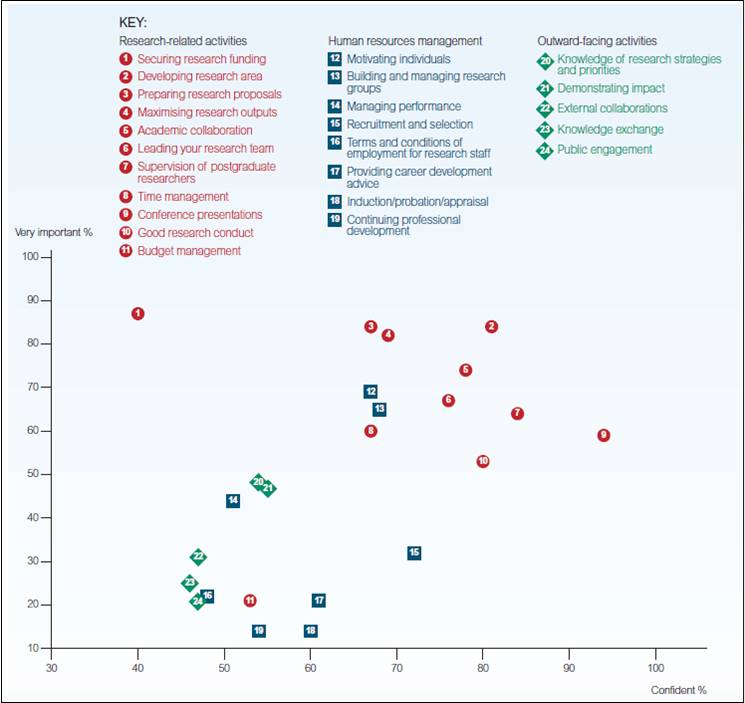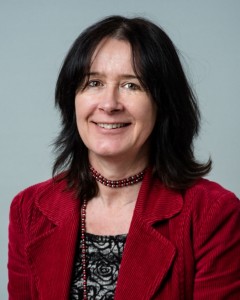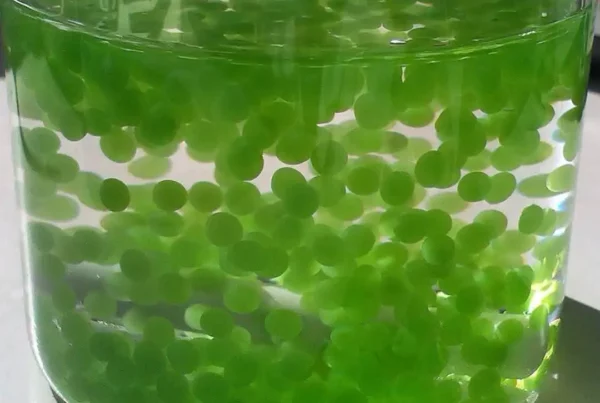This week’s blog post is written by Sarah Blackford.
Plant scientists are generally very good at growing their plants, taking good care of them and making sure they’re well fed and watered. But what about their own development? Who’s growing them?
In a recent survey, Principal Investigators (PIs) were asked to rate areas of their work they perceived to be the most important. Research-related activities were valued the highest (Vitae, 2011), while conversely, “providing career development advice” and “continuing professional development” were rated as two of their lowest priorities, at around 5% (see figure). This, perhaps, is not surprising when you consider PIs need to prioritize a multitude of responsibilities on their ‘to do’ list.

Figure reproduced from Principal investigators and research leaders survey, Vitae (2011) showing the importance of activities and functions for the development of research leaders, against their own confidence in those activities
From small shoots
Like the plant, overlooking the growth of the person could lead to plant scientists being held back from a flourishing career. So, taking responsibility for your own development is vital, especially since programs of professional and personal development are not always readily available to PhD students and researchers in many institutes and universities. Even if they are, the content and timing is not always relevant or convenient. I’ve been delivering bespoke career development workshops for bioscientists, including plant scientists, for over 10 years now and one of the main aims is to help people to help themselves. As well as providing practical information and advice on bioscience-related careers, job seeking strategies and career transition planning, I use interactive exercises and discussions to raise self-awareness. This involves recognizing the range of skills acquired through research, appreciating work values, linking interests with career choice and showing how personality plays a crucial role in effective communication and leadership. During the workshops, the participants complete a personal action plan identifying what they need to do to grow their own careers.
Firmly planted
Most people need to update and improve their CVs (even me!), hone their interview technique and perfect their self-presentation skills. But personal and professional development requires a range of different actions depending on career goals and intentions. Some PhD students want to continue on to do at least one postdoc and then decide whether to carry on after that. With quite a good number of posts available, and with some industry recruiters saying they prefer researchers with postdoc experience, this can be an excellent first step – but be careful to ensure you’re moving forward and building on your experience. Look at the career stories of early career researchers who were awarded this year’s prestigious SEB president’s medal – they relate strategies they have used to fill gaps in their expertise and to position themselves favorably to secure a permanent research leadership position. For researchers who are aspiring academics, their plans may include actions such as submitting an abstract to give a talk at a forthcoming conference, doing some strategic networking or finding a mentor to help them to apply for a fellowship.
Branching out
For those considering a non-academic career, their personal development will depend on which career sector they plan to move into. For example, arranging work shadowing or doing voluntary work can help shift your career towards your desired destination. I helped out at the career service during my job as assistant editor when I was based at Southampton University, giving me enough experience and a reference to break into this career. Internships can provide opportunities to spend time working in areas such as policy, outreach and publishing, and if you’re a budding science writer you can simply start up your own blog, or write on someone else’s – like this one! Everyone would benefit from setting up or improving their presence on social media, whether it’s Researchgate, LinkedIn or Twitter. These global networks help to raise your profile, provide information about companies and careers of interest, build relationships and even advertise jobs. Generic training in communication, networking, self-awareness and other personal effectiveness can help to improve everyone’s self-reliance and confidence.
A fertile future
So in answer to the question, “how do you grow a plant scientist?” I would say it depends on their field of interest and direction of growth. Never think of your PhD as the end of your learning – it’s another new beginning. Even PIs lack confidence in some important aspects of their work, such as securing research funding (see figure) and would likely benefit from training in this area, not to mention management and leadership. Growing plants is your business; without them you would make no progress, nor generate results on which to write your publications and build a career. Ignore your own personal growth and you might be in danger of going to seed!
This blog is a summary of the career workshop, organized and delivered by Sarah Blackford, at the recent FESPB/EPSO Congress 2016 in Prague.
Sarah Blackford started her career in plant science research at York University, moved into journal publishing with the Journal of Experimental Botany and then trained to be a professional higher education careers adviser. She is currently the Head of Education and Public Affairs at the Society for Experimental Biology (SEB) and writes a regular blog for bioscience PhD students and postdocs: www.biosciencecareers.org








